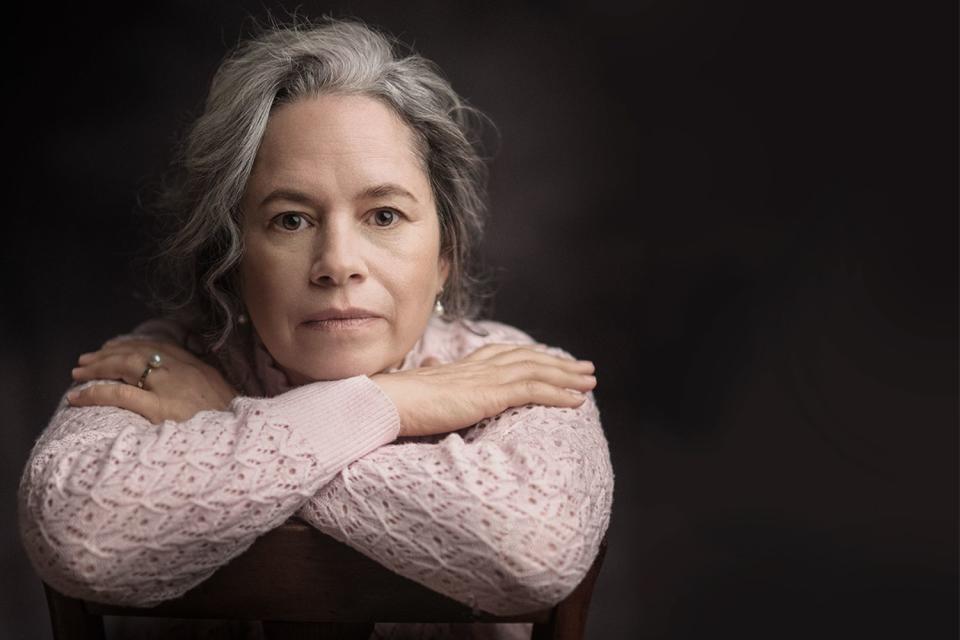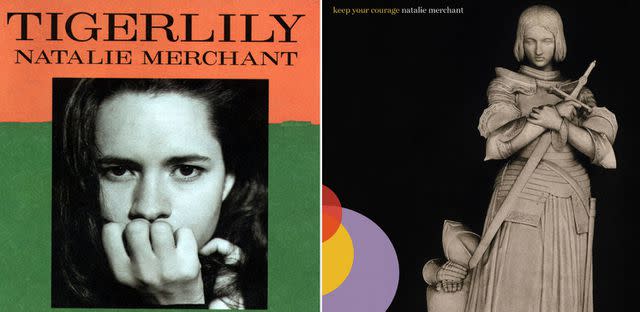Why Natalie Merchant Felt 'Grateful' After Losing Her Voice — And How Singing Is 'Better Than Ever' (Exclusive)
After spine surgery left her unable to sing for 10 months, the Gen X icon is touring again with her first album of new music in nine years

Claire Rosen
Singer Natalie Merchant.In 2019, Natalie Merchant began experiencing an ache in her neck that eventually turned into "unendurable pain." Diagnosed with a rare, degenerative spine condition known as OPLL, the singer, who has sold 15 million albums as a solo artist and as lead singer for 10,000 Maniacs, underwent surgery to replace three deteriorated vertebrae. Afterwards, she was left without her singing voice for 10 months. Merchant, who is now on tour with a fully healed voice, tells PEOPLE in this week's issue how she accepted the loss of her singing ability — and wrote her new album, Keep Your Courage, during the pandemic as a message of hope in turbulent times.
It’s an unseasonably cold day in upstate New York, and Natalie Merchant is bundled in a purple parka for a Zoom call. She turns her computer screen to show the thick haze outside that has drifted in from Canadian wildfires, obscuring the sky above her rural home and making the unusual summer weather all the more disturbing.
“We haven’t been able to go outside for days,” says Merchant, 59. “It’s hard to think about anything else.”
Then suddenly, an unwanted guest appears at her window, stopping her mid-sentence: a 2-in.-long gypsy moth caterpillar. “They’re so destructive that the forest canopy is disappearing,” she explains. “I spent the entire winter crushing their egg sacs. But there she is, so I’m going to knock her down.” She excuses herself to do battle with the invasive species that has been devouring woods across the Northeast: “I will risk going out and breathing that air to kill that caterpillar!”
Since she first hit the music scene in the early ’80s as the teenage frontwoman for the alt-rock band 10,000 Maniacs, and later as a solo artist, Merchant has been a warrior for a cause. Racism, pollution, colonialism, poverty, child abuse — all have influenced Merchant’s songwriting. Her passion for social justice and her literary lyrics — she was once praised as “the thinking man’s Madonna,” to which she replied playfully, “I prefer the Emily Dickinson of pop”— have earned Merchant, who has collectively sold 15 million albums, a devoted fan base.
But three years ago a personal crisis threatened to silence her when surgery for a rare and painful degenerative spine condition left her unable to sing for 10 months. “I thought maybe I was retiring from music,” says Merchant. “I thought, ‘Well, I had a good run.’”
Instead the singer, with her distinctive contralto intact, returned this year with Keep Your Courage, her first full album of original material in nine years — a collection of pandemic-inspired songs that “remind you that you are not alone in your suffering” — and her first major tour in six years, which begins its European leg in October. Now fully healed and back to her whirling dancing onstage, “I’m singing better than I ever have. I think my voice is actually better now.”

mpi04/MediaPunch
Natalie Merchant performing on tour in Florida in April 2023.Related: Melissa Gilbert Feels 'Great' After Spinal Surgery, Will Not 'Live My Life from a Place of Fear'

Larry Busacca/WireImage
Natalie Merchant with 10,000 Maniacs, c. 1988.Merchant was just 17 when she hopped on stage to sing with a local band from her hometown of Jamestown, New York. A year later the group recorded their first album as 10,000 Maniacs with songs written by Merchant. “At 18, it’s not your greatest work,” she says. “But there were moments.”
By the early ’90s the band had three multiplatinum albums and performed at MTV’s Inaugural Ball for newly elected President Bill Clinton. But at the height of the group’s success in 1993, Merchant left the band, saying at the time that she “didn’t want art by committee anymore.” Her solo debut, 1995’s Tigerlily, gave the singer her first Top 10 hit with “Carnival.”
The earnestness of Merchant’s lyrics — and her activism — attracted both praise and snark. (“Even as you wish she’d lighten up, you can’t help but admire Merchant’s uncompromising vision,” an Entertainment Weekly critic wrote in a 1995 review.) But Merchant, who acknowledges her reputation with dry humor, remains unapologetic. “Some people at my record company would’ve appreciated if I had been less cause-y and more sexy,” she says. “But there are worse things than being too serious. And I think time has vindicated me."
The singer, who spends nearly as much time in our interview asking questions as answering them, clearly more interested in conversation than cultivating fame — "I think it requires an obscene level of narcissism to assume that everyone wants to know everything you think, and you feel, and what you are doing," she says — took another unconventional turn after 2003, when she had her daughter Lucia, whom she shares with her ex-husband. For a time, she stepped away from songwriting and touring. “The most important job I had was being my daughter’s mother, and I was able to be present in a very intense way,” she says. She sewed costumes for her daughter’s school plays, was a class parent and helped run the craft fair.
She also volunteered with a local preschool, made a documentary about domestic violence victims and protested fracking. “Songwriting requires solitude for me, and it seemed self-indulgent in the face of these things,” she says. “People think, ‘Oh, you weren’t writing or touring? You must have been sitting on a couch eating bonbons.’ But they were very busy years.”
In December 2019 her health crisis brought her to a standstill. It began with a nagging neck ache that extended down her arm: “The pain was unendurable.” She was diagnosed with spinal degeneration with ossification of the posterior longitudinal ligament, or OPLL. If left untreated, she says, “there’s a chance you may become paralyzed."
OPLL “is a process that occurs when a body over time turns a ligament that’s normally soft and mobile into calcification. Essentially, it hardens,” says Dr. Byron Stephens, division chief of spine surgery at Vanderbilt University Medical Center, who has not treated Merchant. The condition, uncommon in the United States, is more prevalent in eastern Asia. Because of the risks, surgery should be done “as a last resort but if properly indicated can have an incredibly positive impact,” he says.
Related: Jillian Michaels Opens Up About Her Freak Accident, Spinal Injury and Grueling Year-Long Recovery
In March 2020 Merchant underwent a four-hour surgery to replace three vertebrae that had deteriorated. An incision was made over her vocal cords, which needed to be pulled aside during the operation. When she woke, Merchant discovered she could speak but couldn’t sing: “I couldn’t find the power or keep the pitch. I could sing in falsetto, but I couldn’t sing in my real voice anymore.”
"'I could talk but I couldn't sing with my real voice, I couldn't find it.'
"
Natalie Merchant
For 10 months, as the pandemic raged, she was left without her instrument. “While I was deeply saddened by the possibility of not singing professionally, it’s also an emotional outlet for me. I sing all day long. When my daughter [now 20 and a college student] is around, we sing together,” she says. “But I accepted the consequences, because I couldn’t live with that pain. And I feel so grateful to not be in pain anymore."
Not knowing if she could ever record as a singer again, she returned to songwriting amid the isolation and confusion of the pandemic, creatively fueled by “the profound realization that other people are the most important thing.” And by the time she had an album’s worth of material for what would become Keep Your Courage ("an appropriate title for the times — with the pandemic, the climate crisis and so many other crises — to encourage people to stay strong and hopeful"), her voice had recovered.

Credit: Amazon
Natalie Merchant's first solo album, 1995's Tigerlily, which sold 5 million copies, and her latest, Keep Your Courage, released earlier this year.Now back on tour, where she cares for her vocal cords by regularly massaging her neck muscles ("tension in the neck can restrict the vocal cords"), Merchant has a deep sense of gratitude. “The pandemic taught all of us how much we should value simple things,” she says. “I realized how much I valued singing. And this experience has taught me to be accepting of the state of things in my body."
In a world beset by daily tragedies, the singer downplays her personal medical saga: "I just feel like so many people have endured much more than I have — life-threatening car crashes, open heart surgery, brain tumors — It was very challenging and frustrating, but I feel like it's all behind me now, which is exciting."
Merchant realizes that with her spine condition, which is progressive, she may face further complications. But she's refreshingly matter-of-fact about her future: “It’s not curable, so I’m going to fall apart bit by bit like everyone, but my spine is going to fall apart first. I’m just enjoying the time before that happens and I have to decide whether to have another surgery.”
. hereFor more on Natalie Merchant, pick up the latest issue of PEOPLE, on newsstands Friday, or subscribe
For more People news, make sure to sign up for our newsletter!
Read the original article on People.
